Priyanka Nair (Joshi)'s Blog, page 18
July 11, 2021
What Is Peer Counseling And How Can It Help Teens?
The dire need for Peer Counseling: The pressure on teens and young people these days is nothing short of staggering. From enforced social distancing and isolation due to COVID-19 restrictions to the ever-present role of social media, it can be a worrying and difficult time as our kids develop and grow into adults.
As parents we often wonder how we can help support our teens – loving them and being there to support them should be enough but sometimes they need more.
While many parents of teens seek help for specific problems they are experiencing through child counseling services, there is an alternative that you might want to consider which offers a very different approach – peer counseling.
What is peer counseling?Peer counselors are people who have exceptional emotional intelligence and empathy – they are hired and trained specifically because of these qualities. They are there to listen to your child to offer their perspective and tell you their story in order to help them deal with whatever is on their minds.
Many peer counselors have young or teenage kids and so have deep experience of the types of situations that can arise. Other peer counselors are young adults in their 20’s and can relate more directly. Everyone’s child is different and special in their own way, but listening to the experiences of people who have gone through certain situations before can be hugely helpful when trying to navigate the best way to help someone who is struggling.
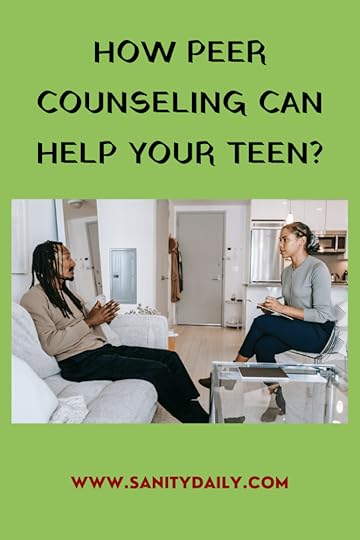 The benefits of peer counseling
The benefits of peer counselingPeer Counselors gain skills in active listening and problem solving that can be applied to many real-life situations. They also receive the good feeling of helping others, while interacting with other peer counselors. This service can also be used as a reference for employers and graduate schools.
Being part of such a group or a one-on-one peer counseling session can benefit you in numerous ways. You get direct advice. Whether you need guidance with a specific issue you are experiencing at work or need advice on how to lead a better life, counseling offers direct advice from people who have been there. What sets this type of counseling apart is the fact that the facilitators or peer mentors are people who have had similar experiences.
The client is able to learn through other people’s experiences. When you decide to go for counseling, you will probably be placed with a peer counselor who has been where you are and have seen what you have seen and worked to recover from it. Being in the company of someone who has overcome the thing that stresses you serve as a reminder that you can find healing and recover from it.
How peer counseling can help your teen
A peer counselor doesn’t diagnose mental health conditions, they are there to listen to your child, share their perspective and experience and help equip them with tools and techniques to make their lives easier.
Being able to share the burden of your responsibilities with a kind, empathetic peer counselor can be enormously helpful.
Places like Peer Collective allow you to choose peer counselors who best suit your child’s needs. You can choose by gender, identity, sexuality, ethnicity and look at the type of background that each individual has so that you can find someone who will be really able to help them.
One of the great things about this kind of counseling is that it costs much less than therapy. A licensed therapist will cost upwards of $150/hr whereas a peer counselor costs $28/hr – and your first 60 minutes at Peer Collective is 100% free.
Why peer counseling might be right for your teen
Peer counseling doesn’t necessarily replace therapy or professional counseling services – but it does provide immediate access to a safe, objective space for you and your child to share problems and issues with someone who is trained to listen and help.
At Peer Collective we have lots of clients who are teens, and also parents of teens. They check in with our counselors about everyday stuff as well as serious mental health issues. Our peer counselors are prepared for all of it.
Please visit Peer Collective today for an affordable, accessible alternative to child counseling services.
July 6, 2021
How Taxing Is Emotional Investment In Relationships?
Emotional investment in relationships is a high volatile investment subjected to maximum risk as it doesn’t come with terms and conditions manual handy. We put in a lot of ourselves in nurturing and replenishing a relationship close to us but it completely shakes our world when it fails.
In this blog, I am going to talk about how we invest love, our emotions and all the energy in one relationship and abandon every other aspect of our life, and when things fall apart, we are left empty and broken.
What is Emotional Investment in relationships?Being an MBA in finance, I have my ocassional financial musings. I will try to make you understand this in a little logical manner because the ones who say that you should never see profit and loss in a relationship, haven’t been mugged in the name of love yet.
Emotional investment is like living in a Disney land, expecting that you will build a castle with your partner one day. You give all your love, energy, devotion and care to that one person in your life, expecting love in return. A long-term investment with a long-term return plan and is not about being conditional but it is human nature to expect, to emotionally attach with someone at a multidimensional level.
 How too much emotional investment in relationships is hazardous to our health?
How too much emotional investment in relationships is hazardous to our health?Too much emotional investment in relationships is hazardous to your mental health if you are the one who gives too much in your relationship if you are the one who goes out of the way to make things work if you are the one who is always emotionally available to pacify your partner and last but not the least if you are tired of being taken for granted all the time.
5 truths about Emotional Investment in relationshipsHere are a few logical truths about emotionally draining relationships, that leaves you empty and builds a vacuum beyond imagination. And then you just gather all the pieces every day, stand up, show up and then go back to fix your missing pieces. It is like getting sucked by some energy vampire every day and fighting with it at the same time.
1.) No returns guaranteed
No matter how much you invest, there is no guarantee that you will be loved the same way and with the same dedication.
2.) Emotions cannot be quantified
How much is too much in love, how much is too much in being emotionally connected with someone? You can’t explain, you cannot measure the amount of love and emotions you attach to a person and it leaves you rattling.
3.) Subjected to maximum risk
No guarantee, no returns and subjected to high risk. The true virtue of a person is only known under different circumstances.
4.) Liability in the long term
An emotionally drained relationship becomes a mental liability in the long term.
5.) Fluctuating dividend
Fluctuating dividends with no growth opportunities, time to revamp the management of your personal emotions.
3 sane tips to save yourselves from the menaceNow, I learned it a little hard. So here are 3 important things you can do to save your sanity.
1.) Withdraw
Learn to leave things sometimes, you cannot fix it all, you can’t have all the answers and solutions. Don’t take all the pressure and burden to make things work, It is your partner’s duty too.
2.) Diversify
Do not restrict yourself to your duties towards your partner. Invest in yourself, upgrade yourself, upskill yourself. Learn new things and never stop following your passion.
3.) Save your sanity
The best savings you could do for your future self and the only saving you need if you are trapped in a toxic relationship. All the other things will fall in the right place if you’re all right from the inside.
Love and light
……………………………………………………………………………

Priyanka Nair is the author of 26 Days 26 Ways for a Happier you and Ardhaviram. An NLP practitioner and Founder of Sanity Daily, helping you prioritize your mental health. Let’s build a happy community.
This blog post is part of the blog challenge ‘Blogaberry Dazzle’ hosted by Cindy D’Silva and Noor Anand Chawla and sponsored by Queen’s Brigade.
July 4, 2021
5 Ways To Cut Off From The Toxic Relationships Of Your Life
There are a lot of things that differentiate human beings from animals. Of course, some biological similarities are there. Yet, the human mind and the ability to connect, nurture, and love makes it more well-groomed. And, when we combine all these characteristics of human beings, relationships come into play. How to cut off from the toxic relationships of your life?
When we hear the word “Relationship”, we get reminded of the people we have in our lives. Relationships play a crucial role in everyone’s world. Whatever we do, directly or indirectly, bends with some sort of validation from the people we have in our surroundings. No doubt, relationships are complex in nature. But, it’s more of our understanding that makes them either messed up or sorted.
When we consist of good and positive relationships in our lives, we blossom, both mentally and physically. But, when it’s the other way around, then things become harsh. Having abusive and toxic relationships can distort our well being in a big way.
Most of the time, it can be hard to spot the negativity and toxicity hidden around, especially in the form of relationships we have.
Why? To be honest, because we don’t want to face the truth. We don’t want to admit that things are not working and will never work. Despite knowing the reality deep down, we keep on trying and putting our energies out there. But what we get is a disappointment, hurt, regret, guilt, and stuff at the end.
That’s why first, we need to understand that toxic relationships are good for nothing. They can’t and won’t bring happiness into your life. In fact, in this whole tussle of negativity and ignorance, we might get too far from ourselves only, and that’s not the bet anyone wants to take. Right?
So, if you are self-aware and conscious enough, it’s not that hard to find out the toxic relationships of your life. Then, how to cut off from the toxic relationships of your life?
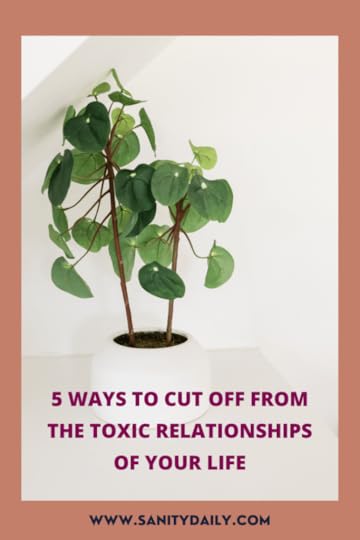
Before moving further, please let’s take a look at some of the most evident signs of toxic people-
Play the victim card every time.Never say sorry or apologize.Use abusive language and gestures.Emotionally drain you always.Live in the past.24*7 Negative mindset.Like to play blame-game.Yes, you can add even more characteristics here if you want to.
Now, sit with yourself and think about the people close to you, friends, family, whatever. Try to analyze their behaviour with you, such as how they make you feel, whether they give you wings. Or, chop them whenever you are about to do something greater in life. Go deeper!
How to cut off from the toxic relationships of your life? What are the causes of your misery or your degrading physical or mental health? Question everything you can! You will get your answers ultimately. And, if the answer is your relationships, then it’s high time for you to kick those negative people out of your life.
Yes! I know it’s not easy to let go of certain relationships, even if they are detrimental to your health. Been there, felt that! It is never easy to break all the strings with people who have been a part of your life. And change will bring discomfort, pain, trauma, and hurt in the beginning.
But, you need to understand your mental peace comes first. And having toxic relationships will never let you reach your fullest potential. That’s why it’s crucial for you to not live in ignorance and delusion of things becoming cordial one day. They will not!
Always remember, doing right things with wrong people will never pay off. It’s a complete waste of your energy and mental space.
How To Cut Off From The Toxic Relationships Of Your Life: 5 positive waysAcceptance is key-Yes, you heard it right! Healing starts from acceptance and acknowledgement of the situation in front of you. If you keep denying things, they continue storing in your subconscious. And it will affect your mental health.
That’s why it’s critical for someone to see the reality as it is, accept it, and move forward. So, accept you are dealing with a toxic relationship in your life, and now you have to do something about it.
2. Share your feelings-
Going through toxic relationships is not easy. But, opening up about your feelings is a vital step towards recovery. Talk about your problems with your loved ones, share what you are feeling with them. It will not only make you let your heart out. But also create a sense of support for you.
Don’t try to hide things from people important in your life. Don’t assume you can tackle everything on your own. We all need love and support at difficult times, so do you.
3. Set the boundaries-
One of the biggest mistakes we human beings usually make is we don’t set boundaries when it comes to relationships. We kind of give control of our emotions and feelings to people involved in our lives. That, in turn, leads us to certain complications, perplexities, and sufferings. Thus, creating emotional boundaries with toxic people is of utmost importance.
Like, very recently, the COVID era has taught us about social distancing. That is relevant concerning negative relationships as well. Similarly, emotional distancing is as crucial as social distancing. One should take it seriously.
It can be difficult to maintain social distance from some toxic people because they live with you under the same roof, for instance. But, if you can discover the art of distancing yourself from them emotionally, you can save yourself from a lot of misery.
4. Seek out professional help-
There’s something about professional help that you might not find anywhere else. Without any doubt, talking and sharing your feelings with loved ones will help you. But after some time, it still might be difficult for you to cope with your feelings and emotions.
At that time, professional help comes in to play big time. You should never play ashamed seeking help from professionals. A big no-no! They will go deep into your situations and provide you with practical solutions from very unbiased perspectives. It is impossible to get from some relative or friend or another person.
5. Invest in yourself-
Relationships are great when they serve well for your well being. But, when they start backfiring your existence, then it’s time for you to introspect on them.
In this hustle-bustle of people and relationships around, we often take ourselves for granted and don’t take out any me-time for ourselves. In short, we forgot to live for ourselves. That’s itself a red flag, which one should never ignore. Hence, you should not stop living for yourself.
Individuality is a beautiful virtue. After turning your face from the toxic relationship of your life, it’s crucial for you to again start living from yourself. Start investing in yourself in every possible way you can.
Initially, you might feel awkward, as you have been ignoring yourself for decades. But do what makes you happy, wear your favourite clothes, eat your all-time cuisine, go for a movie, hang out with your loved ones. In a nutshell, do whatever you always wanted to do.
Eventually, time heals everything. It might sound cliché, but it’s true!
Bonus tip for helping you deal with the toxic relationships of your lifeRetrospection will help you-
As human beings, it’s easy to bounce back to toxic relationships, as we might judge ourselves or feel self-doubt. But, never forget why you had taken that step in the very first place!
Also, retrospection will help you stand still on your decision. How? After cutting yourself from toxic people in your life, you slowly but steadily begin to notice the change in your life, a sense of calm and peace around.
You can then play out some incidents, though relevant memories of your past and recall how that person snatched the peace and beauty of your life.
Ultimately, you will get the validation of the right decision you have taken of parting your ways with that toxic person.
Final Thoughts:
Relationships are all about nurturing and enhancing your spirit and well being and not reducing your inner self.
But, when relationships start to curb your soul and become a source of constant distress, even after trying your best, then there’s nothing better than cutting them off once for all. It is painful, no doubt about it! But, just ask yourself one thing, is it worth your mental space. Is it worth your entire life? I hope you get your answer, and then you will never look back.
Also, always remember, you are stronger than you think! You deserve better in life. You are born to live in an open sky and not under the shadow of toxic people.
About the Author:
Engineer turned Writer Anam Khan is an ambitious and fierce young lady who wants to heal, entertain, and engage people through her writing. After college, she started her career as a Digital Marketing Associate in 2018 but soon discovered her passion for writing. She is working as a blogger and freelance content writer and collaborating with different businesses, enhancing their digital assets through her content creation. She is passionate about mental health awareness. You can read and feel her passion at Youwellbeingg.
July 2, 2021
Jeopardy Of Returning to Work After A Break ~ Things Women Face
Are you a stay at home mom? Are you someone who is returning to work after a break? Or you have plans to? In this blog, I am going to share a combined experience of so many women out there who have been struggling to make it back to their career path after a long absence at work, including me.
A woman who is well-educated, knows her rights and question her existence is always on a lookout for some opportunities to take in her stride, this is one another outcome of the patriarchal system we are embedded with that we have to prove ourselves every now and then.
Being a single parent, now I don’t even have the liberty to mope or brood about my situation, I have to get to work. Although I have strong family support, this is not how I imagined myself in the famous” Where do I see myself in next five years” question, we get asked every time we give an interview.
What is it like to, returning to work after a break?Over the past few months, I have been planning on returning to work after a break. I started applying for jobs. I have been doing good in my writing job, I get paid a decent amount but as a freelancer, it is still a fluctuating monthly income. In order to raise a child single-handedly and keep things running smoothly, I took this decision. But this doesn’t mean I will not blog, I will minimise my spread maybe. I had everything planned out before I began applying to the jobs.
I started with modifying my CV, and it sucked big time with this huge career break of 5 years, because there exists a completely alien world outside our small writing community, and for them, our digital space doesn’t even exist. No matter how amazing you are at your work, no matter how many people love what you do, it becomes so hard to explain it to someone you just met.
So, finally, I prepared two separate CVs one for my corporate job in supply chain management and logistics profile, like my earlier job, and the second one that suits a job profile of a SEO writer/digital creator. I got few matches and even went through a few telephonic rounds.
 Ready to work from homeRestarting after a career break
Ready to work from homeRestarting after a career break Do you know, what was worse than negotiating the salary? The pressure of convincing them that I still exist. Most of the time, when a recruiter is interviewing you, they make it a point to bring you to a level where you either lose yourself or the job. After enough of explaining and putting my best foot forward, I even got reminded of Geet from Jab We Met, where she says, “Aap convince hogae ki main aur bolu? –are you convinced now or should I explain more?
It was when the interviewer laughed and said that “oh so you a mom blogger”(it hit me hard), a good thing to do to pass the time at home. I was at my wit’s end. Because a thing of a time pass doesn’t help you earn name and money. It doesn’t get you listed among top bloggers, write 4 books, one biography and win awards. I wanted to tell it all to that guy but I kept my calm. Breath in, breath out, Priyanka! Then he started negotiating on the salary and considered the base salary I was earning back in 2016, seriously?
I just felt like hanging up the phone but then I reminded myself, this is reality. Every time we try to break the glass ceiling and we find such people in the way who try to break us. I see so many women returning to work after a break with a heavy heart sometimes compromising on their salaries and job profile. Sometimes not even being able to use their full potential because of the unsupportive environment we have got around. So many of us are frustrated inside because we want to do a lot of things, leave a mark behind but we don’t get healthy opportunities.
How to get back to work after a long break?It might sound like losing ourselves in a biological space suit and trying to figure out what might hit us next. But NO, we are not stopping here, neither we are giving up. What we can do is:
1.) Be realistic in your approach
2.) Have a cover letter and CV updated
3.) Set your priorities right
4.) Be open to seek help when needed
5.) Network and look out for career return programs (Godrej, Convergys, Tata group offer some)
I am going to work harder until I establish myself and maybe someday I will find a decent job with which I can pursue my passion for mental health blogging as well. Till then, I am all game. So are you returning to work after a break? I say, bring it on and we will make our way through all the jeopardies.
Love and light
……………………………………………………………………………

Priyanka Nair is the author of 26 Days 26 Ways for a Happier you and Ardhaviram. An NLP practitioner and Founder of Sanity Daily, helping you prioritize your mental health. Let’s build a happy community.
This blog post is part of the blog challenge ‘Blogaberry Dazzle’ hosted by Cindy D’Silva and Noor Anand Chawla and sponsored by Queen’s Brigade.
July 1, 2021
Are You Dating Someone With Relationship OCD?
Relationship OCD is for real and its presence in any relationship makes it complex and very hard to deal with. But what exactly is relationship OCD and how it can hamper the essence of a beautiful relationship?
This post is just for awareness purposes, to make you aware that something like this exists and the person going through it cannot help himself going through such intrusive thought patterns, so we need to help them overcome it and empathize with them.
In this blog, we will talk about relationship OCD, what could be the possible causes and symptoms, and how one can get treated or help their partner with timely intervention.
What is relationship OCD?

Before we talk about relationship OCD, let me brief you about OCD (obsessive compulsion disorder) first. OCD is a type of mental disorder, that causes the individual to do things repeatedly like performing some rituals, washing hands, and being too obsessed about keeping things in order.
Usually, people confuse the need for neatness and cleanliness with OCD but it is way beyond that. Living with OCD is a distressing mental disorder and there is no quirk attached to it.
Relationship OCD on the other hand can be termed as a subset of OCD wherein an individual feels too insecure in his/her relationship. They need constant reassurance about the permanence of their relationship yet they fail to trust their partners. We often doubt our partner and get into arguments over being the possessive one in the relationship but what happens when all this and a lot more becomes an obsession?
This kind of behavior becomes hard for the other partner to digest because they might find it irritating and over-reacting but in reality, it is something they cannot resist thinking about.
There is another form of ROCD in which the partner is obsessed with finding flaws or shortcomings in his/her partner, they can’t focus on anything good and always look at the dark side of the person and it badly affects their bonding.

Like other mental disorders, relationship OCD could also be a result of psychological and biological factors. When you are too dependent on your partner and cannot think about a world beyond them, when you feel incomplete without your partner, or when you fear abandonment and live under constant insecurity of losing your partner, how do you think your relationship will shape out in the future?
We can surely help our partner and help ourselves by being a little aware of the situation. When we don’t pay the much-needed attention this kind of disorder aggravates and gets worse. Timely intervention and little help can reduce the impact of ROCD on your beautiful relationship. Here are a few things you can do or learn about a person going through a relationship with OCD.
1.) ROCD is a mental disorder, individuals cannot help but obsesses over intrusive thoughts that make them helpless and restless.
2.) ROCD could be a result of some childhood trauma, some deep inflicted trust issues, or just a clinical disorder.
3.) A person dealing with ROCD struggles a lot inside their head to keep the balance with their composure.
4.) The urge/anxiousness comes naturally and cannot be controlled in most cases.
5.) These polarising thoughts handicap the individual beyond our imagination.
Related: Are you dating somebody with anxiety?
Few common obsessions your partner might go through:
1.) What if he/she gets along with someone else?
2.) What if he/she leaves me?
3.) Am I good enough for him/her or is he/she good for me?
4.) Will this relationship last forever?
5.) What will I do without him/her?
Few common problems when you in love with a person with relationship OCD
1.) Trust issues
2.) Frequent need for re-assurance
3.) Too overwhelming
4.) Mentally tiring to give constant attention
5.) Lack of awareness creates misunderstanding
How can you help?I know mental disorders are hard to understand, especially if you have never heard about them. If you really love your partner and you think something is wrong and is affecting your relationship, the trust issues, the constant need for assurance, then it is time to talk. You can always have a nice conversation at length and try to get into the head of your partner, completely being non-judgemental.
1.) Communication is the key: Talk to each other. Talk about how you feel about your situation, provide a safe space for your partner to open up and express their feelings. Suppression hurts and aggregates such feelings, dismission is even more dangerous in such cases.
2.) Consult a counsellor, there is no shame in seeking professional help. Mental health is as important as our physical health so why be ashamed of meeting a therapist if you have any trouble adjusting with your mind. You and your mind are not gelling well, maybe it’s time they both need a small re-wiring, go for it.
3.) Maintain a mood journal to understand the triggers. Understanding triggers ar very crucial for any mental disorder.
To conclude, we all need healthy and peaceful relationships and for that, we need good mental health. Little awareness and understanding of the real problem can help us closer to get some solution. I hope with this post, you will get a brief idea about relationship OCD and how it can affect your relationship if things continue in the same fashion. Be aware, be there and you can save your relationship. Rise up!

Priyanka Nair is the author of 26 Days 26 Ways for a Happier you and Ardhaviram. An NLP practitioner and Founder of Sanity Daily, helping you prioritize your mental health. Let’s build a happy community.
June 28, 2021
Ten effective ways to deal with a toxic mother in law
How to deal with a toxic mother in law? How to get away with her critical and cunning behaviour and save yourselves from the damage caused by her abusive words? If we come across toxic people in life who are not our family members, we can completely cut the chords with them but how to deal with a toxic mother in law who stays with us?
The most saddening part of our patriarchal society is, even after witnessing a lot of difference at the global level, where women have proven themselves, made their mark, and reached the moon. Still, the head woman of a house cannot get over her superiority complex, insecurities with a new daughter in law and criticism.
When an elder person of the house cannot deal with such sensibility and maturity, how is a newly married girl who suddenly becomes a woman is burdened with so many expectations?
Questions like these kill us from the inside, bothers us, and we indulge in mental arguments, finding ways to deal with the toxic mother in law we got to stay with. Let me help you with your journey and make it a little less stressful. Let us hold hands, take a deep breath, and stay hopeful for a better tomorrow.
How to deal with a toxic mother in law?Dealing with a toxic mother in law is not a cakewalk but we can at least try to make things work from our end. It is said the be the change you want to see in the world. Perhaps we can start with a change in approach in our reactions towards our mother in laws’ nasty actions. Easy way to start right? Let’s see what we got to discuss.
Ten effective ways to stay sane while dealing with a toxic mother in lawIn my post titled, is your mother in law jealous of you? I have mentioned that envy is one of the most common traits in human beings, especially women. It has affected us all. And jealousy and comparison are the most common attributes of any mother in law.
It sounds so unreasonable comparing yourself as a mother in law to a 25-year-old newly married girl. But since she cannot change her mindset let us help her and help ourselves by following some useful ways.
1. Maintain emotional distance 2. Do not pull triggers3. Don’t judge yourself4. Don’t please the society5. Don’t seek validation6. Don’t lose your kindness7. Think about your sanity8. Forgive and forget9. Stop expecting10. Stop overthinking
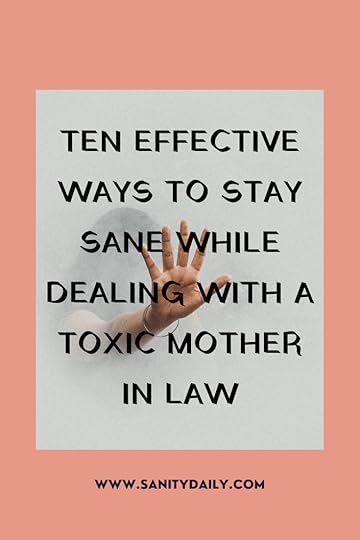
1. Maintain emotional distance
This is very important. What do we do as soon as we realize we have landed at the wrong address, we step back? Right? Now when you have learned that the mother in law you got gifted with is a toxic one who will leave no chance to pull you down. You need to step back right there. How will you save your sanity by living and dealing with difficult in-laws?
The thing about toxic people is that even if they try to be nice, their superiority complex will not allow them to do so, which will ruin you emotionally. Maintain an emotional distance. Do not give access to your happiness in her hands. Stay away. Detach and indulge in some fruitful activities.
2. Do not pull triggers
Never pick up fights and get into arguments to prove yourself right. Do you think she will let you win? Rather she will turn it into a situation of war and in the end, she will use her biggest weapon, TEARS, she will cry and make you feel guilty, and unknowingly you will find yourselves soothing her. Just recall your past experiences and you will understand how to deal with a toxic mother in law in such a situation. Leave her on her own.
How to deal with a toxic mother in law? Don’t say things that might end up in a troubling situation and cause mental stress, yes the hateful behavior of your in laws can cause you mental stress. With time, you understand the triggers which lead to a very unpleasant situation between you and your mother in law. Avoid pulling such triggers.
3. Don’t judge yourself
How to deal with a toxic mother in law? Dealing with toxic people leaves you rattling and stressed. You drain your energy thinking about what went wrong, how you could have avoided this and what you could have done, and all the series of thoughts pointing towards judging your own self. It only leads to a series of disturbing thoughts in your mind.
It happens, and it is very common in a daughter in laws to feel that they might lack a certain ability to manage her mother in law and keep her happy. This is because of the societal conditioning we are part of. They make us believe that it is a daughter in laws’ job to keep things smooth and flowing in the family.
4. Don’t please the society
A toxic mother in law is hard to please and will never be happy no matter what you do to please her. There would be times when you will be forced to strike a conversation, especially in public or social gatherings. The societal pressure to show that everything is good, you know?
But who knows once the party is over the game of playing well also gets over. Toxic people are also great manipulators; They can be two-faced and will always hide the face they show to you in public. She could be an example of a living narcissist, you know what does it mean? Narcissism is a type of personality disorder in which a person is full of himself and is too hard to deal with.
5. Don’t seek validation
A toxic mother in law will validate nothing you do. She will question you, criticize you, and even doubt your intention. Why do you need validation at all? I know you will think that they are elders; we have to respect them and in order to balance the peaceful environment of your house you give up on yourselves and seek validation from your mother in law in everything you do?
First of all, respect can never be demanded, it is something that comes naturally for a wonderful soul. Secondly, if you will seek validation for everything, that too from someone who already dislikes you, you will end up living a life of a prisoner of your own circumstances.
6. Don’t lose your kindness
Remember that maintaining family harmony and peace is every family member’s duty, not yours alone. If your mother in law is so blind that she cannot see what harm her behaviour is causing at the family level at least you deal with the situation with a sane mind and do not let it hamper you.
How to deal with a toxic mother in law? You don’t stop being yourself, be kind, be courteous. Do not leave your true nature just because they do not appreciate you being yourself. You never will be appreciated for all the good deeds you do, but it doesn’t mean you stop doing it. You don’t have to do it for others but where you feel the peaceful environment of the house is at cost; you need to stay kind.
7. Think about your sanity
There is nothing worth losing your sanity for. How will you live a life in such a condition when your mind is filled with so much negativity? It will ruin you from the inside. It will make you restless and helpless. Think about your own future, your kids, and yourself.
No one will come to rescue you; if you are lucky enough, your partner will support you morally, and that too with very limited involvement. Take charge of your inner self to reflect some positivity around your life. Pause and reflect, take charge of your life before it is too late.
8. Forgive and forget
It is hard to forgive someone who is not seeking forgiveness; a toxic mother in law will never seek your forgiveness. Just remember this if she has been a toxic element in your life for a long time and if any given circumstances, she tries to change her approach towards you. She might not apologize for what all she did to you.
Accept her the day you see her changed approach, forgive because she won’t ask and you need closure. Forget because she is trying and you want happiness around you too. Look ahead. Move on. DO not hold grudges for too long as they might turn infectious and ruin you from inside.
9. Stop expecting
The biggest problem in every relationship is the burden of expectation we put on each other and others put on us. It has to be this way or that way, as they say. But maybe those ways don’t work anymore. There could never be a set of benchmarks to deal with relationships.
Every person is different, and every situation is different. Then how to deal with a toxic mother in law and expect less despite living in the same house? As being a woman there would be situations when you might feel that she should help you, look after you but in the back of your mind you always know, you will be hurt if you expect her to help you. Because you know she won’t, then what will hurt you more, she not helping you or your expectations?
10. Stop overthinking
A toxic mother in law plays with your head. Don’t let her toxic behaviour spread poison in your mind and your thought patterns because it will affect how you think and how you deal with others. The only reason she is toxic because she feels she is important, she is above all, and her dismissive behaviour ruins your mental peace.
But the more you think about what she says to you or what you could have done. It will only lead to a trail of mental arguments in your mind. Whenever you will be alone, you will deal with such negative thoughts, stop doing that to yourself.
What causes toxicity in a mother in law?

How to deal with a toxic mother in law? I have thought a lot about this, what makes a mother in law so notoriously toxic? Why she cannot accept another woman in her house with dignity and pride. Treat her as her own. Provide love, make her understand things, and explain her family rules if any. Once a mother in law adapts this approach, it helps in breaking the ice and a daughter in law also feels welcomed as an equal family member. This kind of approach can set a benchmark and prove that yes a woman can care about another woman.
But contrary to my fairy tale belief, what I see is even in the 21st-century mother in laws still sticks to their rude, arrogant, ignorant, insecure and snobbish behaviour, which ultimately fills a daughter in law with negativity and bitterness. What causes such toxicity in the mother in laws? Why do they behave so illicitly? I wonder. Hence, I new bride is always filled with negativity towards mother in law because of the fearful stories she had heard and experiences she had witnessed with her near and dear ones.
How it affects the daughter in law?It is sad to see that a daughter in law hardly gets any breathing time and moment to understand every family member before she is dished out completely. Even at a workplace, when you join a new profile, employers give you the advantage of the honeymoon period. You see things; you understand the surroundings and then you gel.
I would just like to add that no matter how much one thinks about, how to deal with a toxic mother in law and how much you try to please your mother in law who doesn’t like you. It will only upset you.
Don’t try too hard; she is frustrated but maybe not at how you are as an individual, but with the place, you are at. If she would have made your companion and shared things with you, it would have been a different story; You could have even helped her. But some people choose the other way round to suppress their inner fears. Forgive, forget, and learn to let go, for your sanity.

Priyanka Nair is the author of 26 Days 26 Ways for a Happier you and Ardhaviram. An NLP practitioner and Founder of Sanity Daily, helping you prioritize your mental health. Let’s build a happy community.
June 27, 2021
Here Are A Few Things I Learned Being A Mental Health Blogger
Yes, I am a mental health blogger, I write about all the things people hesitate to share and own. There lies a lot of shame and stigma around mental stress, our societal standards are such that it fails to give a safe space to any individual to open up and work on their inner feelings.
My first blog “Virtual Siyahi” is a result of my mental distress, I needed a getaway and, I found one in writing. I decided my niche as mental health unknowingly and, now I know what I am doing is not only a theme for blogging but it is a never-ending cause, hence I pray I continue to help my readers through my voice as a mental health blogger.
I have penned down over 800 blogs and I am too passionate about my work. I am from a completely non-psychological background, had no idea about the language and basic understanding of dealing with someone going through any mental disorder, but I knew to be kind and empathise with others, that helped me.

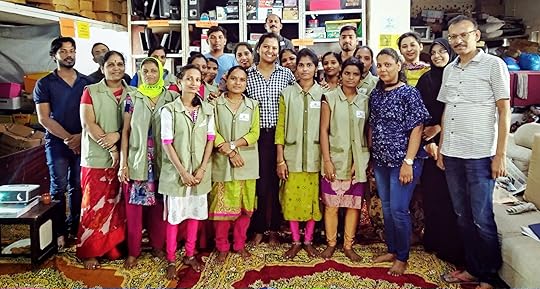
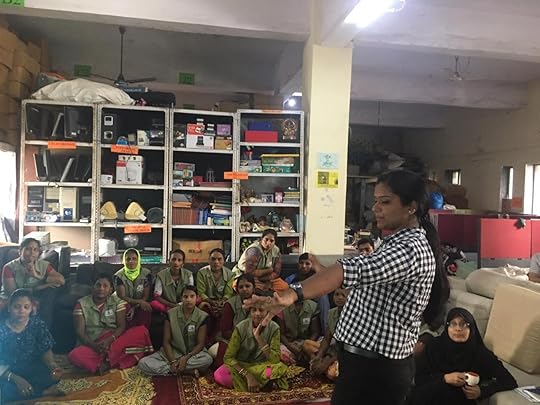
As I went ahead with my passion for writing and my purpose to spread awareness, I realised I need to learn a few things to be able to help my readers in a better way. Hence, I did a few certification courses like psychological first Aid, mental health ambassador, mindfulness and right now pursuing CBT (Cognitive Behavioural Therapy). Last year, I had also enrolled myself on a full-time NLP(Neuro-Linguistic Programming) Practitioner certification course which lasted four months.
I have invested a lot of money and a huge amount of time to upgrade myself and I am still open to learning 🙂 Being a mental health blogger, I have not only learned the right approach but this journey of mine has taught me a lot of other things as well.
5 Things I learned being a mental health bloggerThis dedicated portal “Sanity Daily” is an attempt to not only provide a safe space to my readers but also a venting space for anyone. I receive dozens of messages daily from different corners of the world and today my blog is read in more than 60 countries, all organic visitors.
Two inferences: People need help and people are suffering. Hence a lot of work remains to be done.
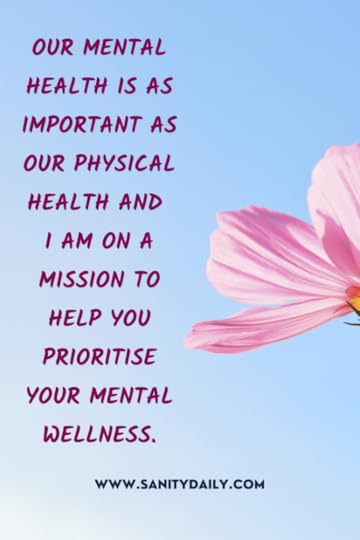
So here a few things I learned in my mental health blogging journey so far:
1.) I learned the right language
It is very important that we have the right approach while we try to ease someone’s pain and also make sure that we share the news of suicide or any other news with trigger alert and with the utmost sensitivity.
We must be an active listener, we never say committed suicide, we say died of suicide. I learned this in my journey.
2.) I learned that kindness costs nothing
And, that’s how I came up with my initiative “Letters of Compassion” where in, I started sending hand-written letters to the strangers connected in the virtual world.
3.) I learned to empathise
No, it is not difficult to put yourselves in the shoes of others, because that’s when exactly you get an idea about their situation. All you have to do is stay unbiased and open to what you might learn about that person.
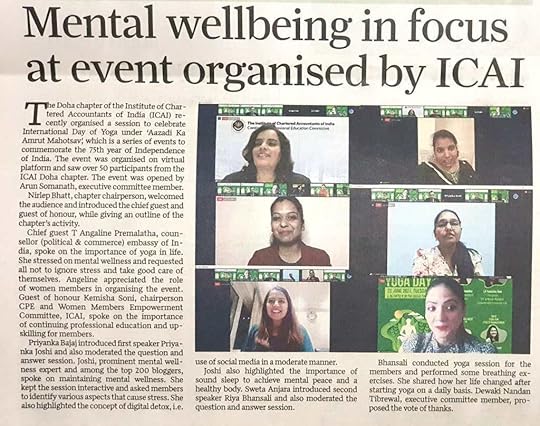 The Institute of Chartered Accountants of India (ICAI), DOHA
The Institute of Chartered Accountants of India (ICAI), DOHA4.) I learned to stay non-judgmental
I learned to be non-judgmental, one of the biggest breakthrough for me. I deliberately think about all the possible reasons before concluding anything about any person. We all are fighting silent battles and many of us don’t even speak about it.
5.) I learned to let go
Too much holding on results in a severe burn-out, and after a point of time, it becomes important to let go of things that don’t spark joy in your life and people who bring out the worst in you. I learned this the harder way, but I have made it my mantra now.
Today, my blog is listed under the top 15 mental health blogs worldwide, many of my posts rank on the first page and I have received a lot of love and support from my readers and fellow bloggers. I am grateful to everyone who has been there for me in my second inning of life. And, I promise to continue to walk on the path I have chosen for myself.
……………………………………………………………………………

Priyanka Nair is the author of 26 Days 26 Ways for a Happier you and Ardhaviram. An NLP practitioner and Founder of Sanity Daily, helping you prioritize your mental health. Let’s build a happy community.
This blog post is part of the blog challenge ‘Blogaberry Dazzle’ hosted by Cindy D’Silva and Noor Anand Chawla.
June 26, 2021
The Role of Parents in the Education of Their Child
The role of parents in the education of their child is such that parents are the first teachers of a child. Education starts at home, followed by formal education at school and so on. For formal education, kids still require help and support from their parents. The starting of education is from schools when you take them to their first nursery class. It extends to informal education involving little things like gardening or learning how to drive.
If kids do not get a proper environment for education or even permission from parents, they can’t get an education. But just admitting your child into Montessori or other grades does not fulfill your duties as parents. Like parenting is a life-long project, your involvement in your kid’s education has no end, and they need your hand in non-formal education.
That was for formal education, but education in broad terms can include mannerisms and learning in every little step. So you as a parent should provide learning and make a feasible atmosphere for discussion on any topics. Learning can be at school, at home, at your neighbour’s house, or even digitally through free online learning websites or remote learning. All parents have to do is be there for their kids’ education.
 Why Is The Role of Parents Important in the Education of Children?
Why Is The Role of Parents Important in the Education of Children?Role of parents in the education of their child is very important, Kids want their parents involved at school. Not only for the sake of society or to show in front of friends and school. The natural attention-seeking pattern in kids includes their parents’ attention in education too. Parents need to be involved in school activities and education as a whole.
There are various benefits of your presence at your kids’ parents-teacher meeting. Your care on educational matters of kids directly impacts them. The role of parents in the education of their child could benefit in the following ways when parents fulfill their roles in kids education:
Kids perform better in school tests:When kids know that their parents care for their performance in tests or examinations, they perform better, even for the sake of their parents. Too much pressure on kids is not good but appreciating and encouraging kids is always best. Comparing your kid’s performance with other children’s performance is not advisable.
Kids perform better in standardized tests:When parents support their kids for standardized tests like SAT or GMAT or even ask for it, kids become happy because it is their aptitude test. The goal is not always seeking higher marks, but if parents understand kids’ hard work, then kids perform better without the pressure of excelling.
Better Attendance:Knowing that you backup your kids and are concerned about their going to school, kids will want to be present at school, and their attendance is high. It is always better when kids are regular and on time at school.
Confident and friendly:One of the prominent role of parents in the education of their child, when parents ask kids about kids’ school activities, kids talk about little achievements or friend circles. Kids become confident towards themselves as parents boost kids up. They start becoming friendlier toward their peers and abstain from unwanted actions.
Disciplined:If your kid has a habit of staying disciplined at home, they will act the same way in school. When kids listen to parents, so will they listen to teachers? Kids will grow up responsible and discipline themselves.
When you don’t care enough for kids, they might show this lack of attention. Due to lack of support from home or parents’ inability to spend time with kids, children start bullying other children and breaking the rules. So you should stay in touch with your kid at home and know their situation from time to time.
Social skills:Kids whose parents fulfill roles in the education of children have better social skills. They are more cheerful and tackle problems better. They are filled with love and care from parents and spread out the same. Professionally, they are confident and perform better than other kids, and have improved social skills.
Well prepared for education after high school:Kids cannot cling to their parents all the time. When kids have better support for education, they have a strong backup for independence and can cope better with the idea of studying or getting higher-level education even after high school. They know that their parents are always there.
15 Important Role of Parents in the Education of their Child are:1. Know about Kids Performance In School:Parents should take an active role in their children’s education. They should be aware of their child’s academic achievement and performance. Parents can get a solid sense of their child’s performance from online grading portals, report cards, and school progress reports, including grades, attendance, conduct, and teacher feedback.
After looking at such reports, parents can discuss and decide on what steps to do next. If kids are performing better, then it’s good, but if they are not, parents need to help kids out either by conversing with them as to what the matter is or by actually helping them study and finding a solution to the problem.
2. Be Present At Parents Teacher Meeting:The most significant person to talk to about how well a child is doing in school is the teacher. Frequently, the teacher will provide feedback on the student’s academic and emotional, and social elements. If there are issues that are preventing students from learning and succeeding, teachers will notify parents.
Getting to know your kid’s teacher personally will keep informing you about your kids’ day-to-day activities at school and their changes in behavior. So it is better to know the teachers of your kid and be present at the parents-teacher meeting.
3. Discuss With School Teachers:A parent-teacher association, or PTA, is a group of parents and teachers whose goal is to encourage family involvement in the classroom. A PTA exists in almost all elementary and middle schools (public and private). Parent-teacher associations play an essential part in the development of programs that meet children’s educational needs.
You can have a thorough discussion with the members and derive conclusions about your kid. After all, both you and the PTA are working together to better and overall develop your child. At times both can help each other out.
4. Participation In School Activities:School activities provide excellent chances for kids and parents to interact. Participation in school functions, contests, and athletics is greatly encouraged. Children, especially their parents, have a natural desire to display their abilities and skills for all to see. It’s also a great way to get a sense of the school’s atmosphere and how kids connect.
5. Direct Communication:The importance of communication between parents and children cannot be overstated. It is the parent’s job to provide direction and advice. You can discuss problems and solutions during these one-on-one meetings. All children require time with their parents to have a heart-to-heart conversation.
6. Role Model:During their early years, parents are their children’s first teachers. When a child starts school, the responsibility of teaching does not end. Children will frequently require assistance with their homework — in math, science, and social studies. It is upon every parent to demonstrate how fun and valuable learning can be.
7. Daily Connection With Kids:Kids can apply many of the things they learn in school for real life. When cooking, for example, you can discuss units of measurement with your child. You can discuss celestial bodies (the sun, moon, and stars) and the weather outside the science discipline. If your youngster is interested in gadgets and objects, you can explain how the computer, refrigerator, and other electronic devices work.
You can also talk about security inside and outside the house (what to do during a storm, fire, or earthquake). The role of parents in the education of their child needs regular communication. Please make this a regular habit for your child’s life to encourage his or her curiosity and drive to learn. Connect with your kids in small matters.
8. Reading Together:Doing things with parents gives them a sense of security and support. One of the most acceptable ways to stay connected with your child’s schoolwork is to read the lessons together. Reading not only enhances their vocabulary but also piques their interest in reading. It’s also a good idea to take children to the library together and discuss lovely books to help them learn more outside of the classroom. Here are the best free educational websites for kids that we would recommend.
9. Providing Better Environment:Parents should ensure that their children live in a tranquil and pleasant environment at home. It’s best to avoid addressing family issues in front of the kids to reduce disputes at home. Both their father and mother should value their children’s academic pursuits and provide them with enough moral support.
10. Help In Homework:Supporting children in their academics would significantly improve their motivation to learn. Small gestures, such as assisting children with homework or tasks at home, can demonstrate this. However, doing every lesson for them and letting them play is not recommended. Do it jointly, and give them some pointers and advice on how to improve their assignments.
11. Advice:If you see that your child is underperforming or placing less emphasis on education, address them right away. However, sabotaging their peace of mind with hurtful comments is not a good idea. If you identify any flaws, be patient and offer constructive criticism. Rather than merely blaming them, teach them what is right and wrong.
12. Helping for Test Preparation:Please don’t leave them alone with their lessons when it’s test time. With solid coaching and support, assist students in preparing for the exam. You might also run mini exams at home before the extensive examination to alleviate your exam anxiety. You can also provide extra assistance in the areas of the class where they are struggling.
13. Encouraging:It is critical to provide good motivation to a child to perform better in school. So, if kids get good scores on the tests, don’t be afraid to reward them. Encouragement instils in them the desire to improve their performance the next time around and here comes the role of parents in the education of their child. However, there should be a limit, and it is not a good idea to over-gift them for a mediocre performance since this will dull their killing instinct.
14. Giving Time:Working parents are sure to be busy due to their hectic activities. Set aside some time for your children, though, and don’t leave them alone at home. Maintain a positive parent-child relationship to create a welcoming environment for them at home. In their spare time, they should eat together, play with them, and take short vacations to clear their heads.
15. Prioritize Learning:Studying is a vital part of a child’s life, and parents should prioritize it when making other decisions. Make it a priority and prevent any unneeded travels or functions that may interfere with their studies.
Conclusion:Thus, if you as a parent keep an eye on your kid’s education and fulfill the necessary roles, then kids will have a better education. Remember that admitting your kid to schools and colleges is not the end of the journey to a parent’s responsibility in a child’s education.
The role of parents in the education of their child is of utmost importance. Shower your kids with enough love and care and show that you are there for them. Extreme expectation towards your kid’s performance is not suitable for their psychology. Let them know you care genuinely and do not seek perfection in the results of your child.
After all, we were all kids at a time in our lives, and the pattern of education is not always what we expect it to be. There can be highs and lows, but keep encouraging your child not to let their spirit go away.
Love your kid and be a responsible parent first by fulfilling your roles in their education. Rather than better results, focus on the discipline and overall behavior of your child. Discipline is the best non -formal education a parent can give their child.
About the Author: Hi, I am Susmita Adhikari, an editor at fenced.ai where I love to share my experiences and parenting tips. I’m a mom of one who loves to write about mental health and positive parenting. Apart from this, I love frugal travel, cooking, and standing up for things I am passionate about.
June 25, 2021
क्या आपको छोटी छोटी बातों का टेंशन होता हैं?
June 24, 2021
Here Are A Few Stigmas Attached to Men and Mental Health
Let us talk about men and mental health stigma! In India, men are still under the burden of being the sole/primary providers for their families, they are expected to be successful and high-earning, they are expected to perform well academically while also taking an active interest in sports.
Ask a young man, between the ages of 20-25 about what their concern is and you’ll see a theme emerging. The primary things concerning men are looking for a job, which requires performing well academically. The job is seen as a means to start a family later on in life. “If you don’t have a good job, who will marry their daughter to you?” A line that many men listen to at some point in their life.
 Why Men And Mental Health Stigma?
Why Men And Mental Health Stigma?With the burdens that the modern Indian man has to go through, it shouldn’t be a surprise that nearly 92,000 men died by suicide in 2019 and that men account for nearly 66% of all suicides in India. The psychological perspective proposes that suicides are invariably linked with clinical depression but if you look at the numbers, men are less likely to be diagnosed with clinical depression than women. What could possibly explain this discrepancy? Men are less likely to be depressed (or at least, be diagnosed with depression) but are more likely to die by suicide.
From the time they are born to the time they grow up, all human beings go through socialization. Socialization is when children learn what is expected of them, what the norms are and what boundaries if crossed, can lead to punishment. In a society as diverse as the Indian one, it is natural that norms and rules are not the same everywhere. Yet, the socialization of girls and boys i.e. the norms that are imposed on them are eerily uniform across the country. Let’s focus on the boys.
These are some things that almost every boy has heard at some point of their life.
You won’t achieve anything in lifeWhen will you grow up and take responsibility for the house? You have to take care of us after all.If you don’t get a good job, no one will want to marry you.What’s your package? (Pun intended?)And then the evergreen cliche — “Boys don’t cry. You are strong.Strong kids don’t cry. You are a tiger. Tigers don’t cry.”Did you notice the number of responsibilities that are imposed on men either implicitly or explicitly? Leading to never-ending men and mental health stigma. A man that doesn’t provide for his family, take care of his parents, have a high paying job and a stable career is of no value at all! With the implicit burden of all these expectations, it is natural that a man going through emotional turmoil is going to put his needs aside for the sake of his responsibilities.
And that’s where the problem begins – when men put the needs of others over their own needs, for the greater good of the family/society.
Perils if men and mental health stigmaFrom my research, I remember a quote that has stuck with me ever since. The participant was a 27-year-old man who had tried to take his life multiple times, was secretly visiting a psychiatrist and hadn’t told his family that he had been diagnosed with depression. When I asked him why, this was his response:
“My mother had a lot of expectations from me, that I would buy her a car, then house…and I still owe my mother all these things.”
Think about this.
A man who had tried to take his life, who woke up every day with the thought of dying, was keeping it all from his family because he didn’t want to disappoint them.
While this may be the one story I have come across, there are thousands of similar stories out there that go completely unnoticed and unheard.
So many men live with the fear of being dismissed as ‘weak or feminine’ or with the fear of being laughed at that the things, that are felt are simply not expressed. It would be erroneous to say that men don’t have emotions. It is more appropriate to say that they express it through their actions instead of in their words and we need to start listening as soon as possible.
It is very easy to say that things would be easier for men if they weren’t so quiet and secretive about their emotions all the time, but how difficult it must be to break through a belief that has been instilled in you since you were a child? We need to rather focus on the mechanisms that discourage men from being verbally expressive while also trying to understand the different ways in which men express their emotions now.
Keep a look out for a man who is more silent than usual, more withdrawn, more aggressive or behaving completely differently from his usual self. A caveat here is that it is not necessary that only men express their depression this way. There are women who have been observed to express themselves in the same patterns as the men. This suggests that it is not simply the biology of an individual but also the role that their social surroundings, childhood development and others play in the expression of emotions.
Suicide among men is an unseen epidemic and a lot of that has to do with the lack of access to mental health services for men. On the off chance that they do end up visiting a professional, the chances of the way in which they express their emotions being ignored means that there is a systematic issue, right from the home to the doctor’s office in how depression in men is understood.
Our men are killing themselves and we can no longer ignore it. Speak up against men and the mental health stigma attached to them.
—————————————
About the Author: Arjun Gupta is an author and a mental health blogger. He is currently pursuing MA in Psychology from Ambedkar University Delhi after having completed his graduation in Applied Psychology from the University of Delhi. Having survived clinical depression and multiple suicide attempts, Arjun offers diverse and informed perspectives from both sides of the therapist’s table



